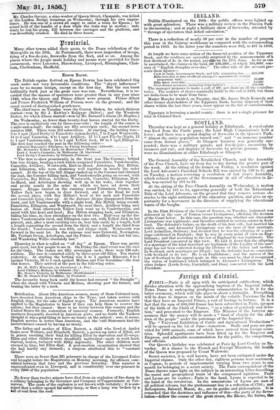SCOTLAND.
Thursday was kept as a general holiday at Edinburgh. A royal salute was fired from the Castle guns ; the Lord High Commissioner held a levee ; and there was a grand display of fireworks in the Queen's Park. "Almost the entire population turned out," and "an immense number came from distant places." At Glasgow business was generally sus- pended; there was a military parade, and feu-de-joie; excursions by steamers and rail ; and displays of fireworks by private persons. There were no illuminations at either Edinburgh or Glasgow.
The General Assembly of the Established Church, and the Assembly of the Free Church, have sat from day to day during the greater part of the week. At the sitting of the former on Friday, a resolution against the Lord Advocate's Parochial Schools Bill was carried by 120 to 3; an on Tuesday, a motion reversing a resolution of last year's Assembly, which refused the grants of the Government in aid of education in In- dia, was carried by 195 to 64.
4it the sitting of the Free Church Assembly on Wednesday., a motion was carried, by 191 to 34, approving generally of both the Educational Bills of the Lord Advocate, on the ground that they remove Serious ob- stacles to the right settlement of the education question, and give an op- portunity for a movement in the direction of supplying the educational wants of the burghs.
In the First Division of the Court of Session, on Tuesday, judgment was delivered in the case of Fenton versus Livingstone, affirming the decision of the Court below. In this ease, the question was, whether one Alexander Livingstone was legitimate, and therefore entitled to certain estates in Scot- land. The defender's father, on the death of his first wife, had married hia wife's sister, and Alexander Livingetone was the issue of that marriage. Lord Ardmillan, Ordinary, had decided that he was the offspring of a mar- riage celebrated in England ; that he was in every point of view an Eng- lishman; and that according to the law of England he was legitimate. The Lord President concurred in this view. He laid it down that the offspring of a marriage of the kind described are legitimate if the legality of the mar- riage hes not been contested during the lifetime of the father and mother. In 'Scotland, such marriages are illegal : but the defender hold no connexion with Scotland or its law. He is an Englishman ; and the answer of the law of Sootland to the appeal made in this case must be, that it recognized., the status of legitimacy which belonged to Alexander Livingstone. The other Judges (Lords Ivory, Curriehill, and Delis) concurred with the Lord. President.


























 Previous page
Previous page